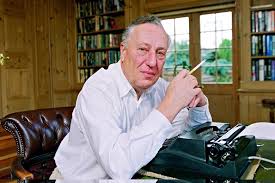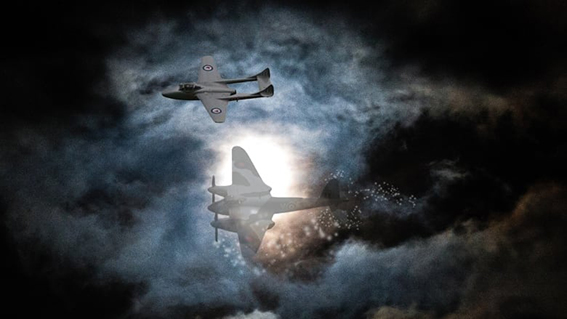
It was our first winter in Alberta. A few months earlier, I’d abandoned a broadcast position in Saskatoon for some writing opportunities in Edmonton. We’d tried to find a house to buy, but in Alberta, then in the middle of a boom, interest rates were north of 12 per cent. So, we rented a bungalow and settled in – my wife, our two-year-old daughter, and our second infant daughter, barely a month old.
As I remember, it was cold and (on Dec. 24, 1979) dark by 4:30 p.m. Out of habit, because we’re dedicated radio people, Jayne and I turned on CBC Radio for “The World at Six” national newscast and at 6:30 the Monday-night edition of “As It Happens.” And that night for the first time, we heard Barbara Frum’s co-host Alan Maitland launch into a Christmas reading.
“While waiting for control tower to clear me for take-off,” Maitland began, “I glanced out through the cockpit canopy at the German countryside…”
Seconds later, probably still preoccupied with the rush to get our kids settled in bed as well as last minute preparations for Santa, that Christmas Eve, my wife and I recognized that one of our favourite programs (normally comprised of interviews with newsmakers of the day) was offering up something different – a Christmas reading on the radio.

Instinctively, we stopped what we were doing, settled on the couch and just listened. That Christmas Eve, Dec. 24, 1979, was the very first airing of Maitland’s reading of The Shepherd, a novella written by Frederick Forsyth, the English writer best known for such thrillers as The Day of the Jackal and The Dogs of War. But Maitland’s velvet tones drew us into the story of a Royal Air Force pilot departing an air force base in northern Germany, in 1957, flying solo, trying to get home to England in time to spend Christmas with his family.
“My watch read 10:15 by the dim, blue glow of the control panel where the rows of dials quivered and danced,” Maitland continued. “It was warm and snug inside the cockpit, like a cocoon shielding me from the bitter cold outside.”
The setting for this short Forsyth story proved a perfect metaphor. Like the pilot hurrying his Vampire jet fighter across Cold War Europe and the vast North Sea toward his far-off English home that winter’s night in 1957, I know Jayne and I in our new surroundings in Edmonton felt as though we were a long way from home too. It was cold and dark, just three days after the winter solstice (the day in the year with the least daylight).
“The problem started 10 minutes out over the North Sea,” Maitland continued. “Somewhere beneath my feet, amid the miles of brightly coloured wiring, there had been a blowout … My compass and the radio had failed together.” The radio play had now delivered this fighter pilot out over the North Sea, alone, with no direction and no communication with the rest of the world. He seemed doomed.
For over a century, since wireless broadcasts were pioneered in this country, Canadians have turned to radio for information, entertainment and a sense of belonging. Particularly in the Depression (the 1930s), when economic collapse, climatic chaos and the great distances between communities in North America made millions of Canadians feel forgotten and isolated, radio gave them a desperately needed connection.
In the words of author Warner Troyer in The Sound and the Fury, “the (radio) crystal set or the genuine console radio … made all the world accessible and exciting.”
But what about that RAF pilot lost and apparently doomed to a watery grave in the North Sea?

“Down below my wingtip, low against the fog, a black shadow crossed the whiteness,” continued storyteller Maitland. “It was another aircraft … obviously, the shepherd aircraft sent up to bring me down.” For my wife and me, hearing The Shepherd that Christmas Eve in 1979 helped us feel grounded even if all we’d known until then was being adrift in a new city.
Now, if the idea of tuning in your radio to exactly the same Christmas Eve broadcast of Frederick Forsyth’s The Shepherd intrigues you, here’s how you can. This coming Monday, Dec. 24, at 6:30 p.m., “As It Happens” on CBC Radio (99.1 FM) will air the very same Alan Maitland reading we’ve listened to each year for 39 years. I won’t spoil your enjoyment of the 45-minute broadcast.
But I’d heartily suggest – for maximum enjoyment – that you pour a glass of eggnog (or facsimile), gather loved-ones ’round, turn down the lights (except for the Christmas tree) and discover a different Christmas classic (where, unlike It’s a Wonderful Life or A Christmas Carol,) your imagination has to create the pictures.
But like the broadcast lifeline of old, you can use theatre of the mind to help connect you to the joy of the season. “Happy Christmas…”
I heard the same broadcast sometime in the eighties one Christmas Eve when my wife and kids were at church and I was at home wrapping gifts. I was absolutely mesmerized by the experience. I was teaching grade eight at the time so I started reading the story to my classes as part of our annual Christmas routine. I continued to do this for several years until my retirement. Here’s to Barbara From, Alan Maitland, Frederick Forsyth and Ted Barris.
I heard the same broadcast sometime in the eighties one Christmas Eve when my wife and kids were at church and I was at home wrapping gifts. I was absolutely mesmerized by then experience. I was teaching grade eight at the time so I started reading the story to my classes as part of our Christmas routine. I continued to do this for several years until my retirement. Here’s to Barbara Frum, Alan Maitland, Frederich Forsyth and Ted Barris.